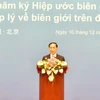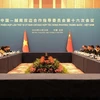The ninth National Party Congress: Promoting the strength of the entire nation, continuing the renewal process and speeding up the industrialisation and modernisation cause.
With the slogan of “Intelligence, Democracy, Solidarity and Renovation”, the ninth National Party Congress convened in Hanoi from April 19-22, 2001 with the participation of 1,168 delegates representing more than 2.4 million Party members nationwide, and 35 international delegations.
The congress reviewed the 70-year path of the Vietnamese revolution, five years of implementation of the eighth National Party Congress’s Resolution, 15 years of national renovation and 10 years of implementing the socio-economic strategy.
It also drew deep lessons and experiences, thus developing and completing the revolutionary guidelines for the next period, which was to strive to further improve the leadership and combative capacity of the Party, encourage and bring into play the strength of the entire nation as well as speed up the national industrialisation and modernisation process.
The congress affirmed that in the 20 th century, the success of the August Revolution 1945 with the debut of the Democratic Republic of Vietnam, the wars for national liberation and defence, the renovation cause and the transitional period to socialism were the great victories.
It also affirmed the country’s great and important achievements obtained during the implementation of the 1991-2000 socio-economic stabilisation and development strategy and the Resolution of the eighth National Party Congress.
The congress frankly pointed out shortcomings and weaknesses that should be repaired.
Regarding the country’s path to socialism, the congress affirmed the Party and people’s determination to build Vietnam into a socialist country on the foundation of Marxism-Leninism and Ho Chi Minh Thought.
About the socio-economic development direction, the Resolution of the ninth National Party Congress stressed on accelerating the industrialisation and modernisation process and building an independent economy, gradually turning Vietnam into an industrialised country with priorities given to developing productive force, and building a production relationship in line with the socialist orientations.
The country should bring into full play its internal strength and take advantage of external sources as well as actively integrate into the international economy for a rapid, effective and sustainable development, the resolution stated.
The country also should boost economic growth together with cultural development, gradually improving the material and spiritual lives of people, while realising the social equality and advance, protecting and improving the environment, and combining the socio-economic development with defence and security consolidation.
The ninth congress elected a 150-member Central Committee. The Committee elected Nong Duc Manh as General Secretary of the Communist Party of Vietnam (CPV).
The tenth National Party Congress: Enhancing the Party’s leadership and combative capacity, bringing into full play the entire nation’s strength, comprehensively boosting the renewal process and delivering the country from its underdeveloped status soon.
The tenth congress took place in Hanoi from April 18-25, 2006. It drew the participation of 1,176 delegates representing more than 3.1 million Party members nationwide.
The congress adopted the Political Report, the Report on Guidelines and Goals for Socio-Economic Development for 2006-2010, and the Report on Party Building, which were submitted by the ninth Party Central Committee.
The congress also approved the full text of the revised Statute of the Communist Party of Vietnam.
With the slogan of “Intelligence, Democracy, Solidarity and Renovation”, the ninth National Party Congress convened in Hanoi from April 19-22, 2001 with the participation of 1,168 delegates representing more than 2.4 million Party members nationwide, and 35 international delegations.
The congress reviewed the 70-year path of the Vietnamese revolution, five years of implementation of the eighth National Party Congress’s Resolution, 15 years of national renovation and 10 years of implementing the socio-economic strategy.
It also drew deep lessons and experiences, thus developing and completing the revolutionary guidelines for the next period, which was to strive to further improve the leadership and combative capacity of the Party, encourage and bring into play the strength of the entire nation as well as speed up the national industrialisation and modernisation process.
The congress affirmed that in the 20 th century, the success of the August Revolution 1945 with the debut of the Democratic Republic of Vietnam, the wars for national liberation and defence, the renovation cause and the transitional period to socialism were the great victories.
It also affirmed the country’s great and important achievements obtained during the implementation of the 1991-2000 socio-economic stabilisation and development strategy and the Resolution of the eighth National Party Congress.
The congress frankly pointed out shortcomings and weaknesses that should be repaired.
Regarding the country’s path to socialism, the congress affirmed the Party and people’s determination to build Vietnam into a socialist country on the foundation of Marxism-Leninism and Ho Chi Minh Thought.
About the socio-economic development direction, the Resolution of the ninth National Party Congress stressed on accelerating the industrialisation and modernisation process and building an independent economy, gradually turning Vietnam into an industrialised country with priorities given to developing productive force, and building a production relationship in line with the socialist orientations.
The country should bring into full play its internal strength and take advantage of external sources as well as actively integrate into the international economy for a rapid, effective and sustainable development, the resolution stated.
The country also should boost economic growth together with cultural development, gradually improving the material and spiritual lives of people, while realising the social equality and advance, protecting and improving the environment, and combining the socio-economic development with defence and security consolidation.
The ninth congress elected a 150-member Central Committee. The Committee elected Nong Duc Manh as General Secretary of the Communist Party of Vietnam (CPV).
The tenth National Party Congress: Enhancing the Party’s leadership and combative capacity, bringing into full play the entire nation’s strength, comprehensively boosting the renewal process and delivering the country from its underdeveloped status soon.
The tenth congress took place in Hanoi from April 18-25, 2006. It drew the participation of 1,176 delegates representing more than 3.1 million Party members nationwide.
The congress adopted the Political Report, the Report on Guidelines and Goals for Socio-Economic Development for 2006-2010, and the Report on Party Building, which were submitted by the ninth Party Central Committee.
The congress also approved the full text of the revised Statute of the Communist Party of Vietnam.
The documents adopted at the tenth congress were the result of the intelligence and will of the entire Party and people and the in-depth practical and theoretical summation of 20 years of renovation in order to continue completing and developing the renewal policy and standpoint in the current period of the country’s revolution.
The congress elected a new Party Central Committee for the tenth tenure, including 160 official members and 21 alternative members. Nong Duc Manh was re-elected as the CPV General Secretary./.
The congress elected a new Party Central Committee for the tenth tenure, including 160 official members and 21 alternative members. Nong Duc Manh was re-elected as the CPV General Secretary./.



















